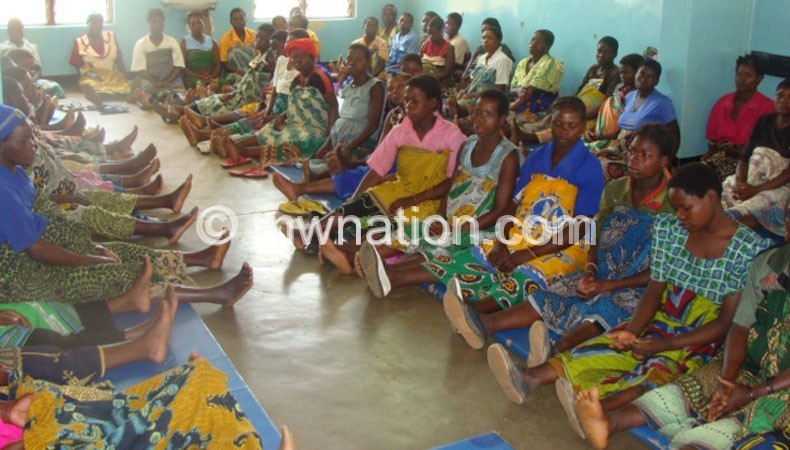Missing MDGs target on maternal health
The Millennium Development Goals (MDGs) expire in 2015 and Malawi will not achieve the goal to reduce maternal deaths. ALBERT SHARRA explores on the interventions implemented and where is Malawi on maternal health.
For Lucy Morola, 28, of Ndunde Village, Traditional Authority (T/A) Njema in Muloza, Mulanje, giving birth at a health facility is a far-fetched dream. She is a mother of three, but none of the children was born at a hospital.

She says her two children born in n2006 and 2008 were delivered by traditional births attendants (TBAs). Her third pregnancy came in 2011 when government banned TBAs from providing delivery services.
“A review of the roles of TBAs,” she says, “forced me to seek maternal health services at Muloza Health Centre, but because there is no waiting shelter, I decided to leave for hospital a day before my labour. Unfortunately, the labour began on the way and I delivered in the bush”
Ndunde Village is approximately 30 kilometres away from the health centre and the main mode of transport is bicycles.
“I cannot afford hiring a bicycle taxi because it is expensive. It costs K500 to and from the health centre and I cannot raise such a sum,” says the widow. Walking the distance is another obstacle as the dusty and winding road on the hilly topography at the base of Mulanje mountain, makes the walk tedious. In random interviews the women in the surrounding villages of Mpholiwa, Sekheya and Manyamba revealed that they want to deliver at the hospital, but are scared of the distance.
Despite being small, Muloza Health Center supports a big catchment area which stretches from Muloza border to the boundary between Phalombe and Mulanje. Mulanje District Health Office spokesperson Innocent Chavinda says the health centre serves a population of 41 089 apart from clients from Mozambique and 1 721 women seek maternal service at the centre.
Dr Khuliena Kabwere, Mulanje district health officer confesses that health centres along the borders of Malawi and Mozambique are overwhelmed because of extra patients from Mozambique. He cites Muloza and Mpala health centres as most affected.
During the visit to Muloza Health Centre, pregnant women were lying on the floor waiting for their turn while guardians were cooking on open ground. In random interviews, some women lamented that the health centre is underequipped.
Chavinda admits this saying the health centre has two midwives and eight beds in the maternal ward.
Safe motherhood dream still drags on facilities. Women walk long distances and services at hospitals are compromised by inadequate facilities. Reports indicate that most health centres have few beds in the maternal ward and midwives handle many deliveries.
According to Chavinda, Muloza handles 28 deliveries per week and this translates to 1568 deliveries per year with each midwife handling 784 pregnancies. At Mzenga Health Centre in Nkhata Bay, a midwife handles 540 pregnancies per year. This is too high according to the World Health Organisation (WHO) recommendation that a midwife should handle 176 deliveries per year.
Nurses and Midwives Council of Malawi (NMCM) says Malawi has registered a steady increase in number of midwives from 6 889 in 2005 to 11 122.
Maikhanda, a non-governmental organisation promoting safe motherhood, told Nation on Sunday of June 22, 2014 that it has rescued many women from TBAs.
In Muloza, Kwa a Nangondo, a shunty house located along Muloza River which cuts the boundary between Malawi and Mozambique, is the home for desperate pregnant women who find it difficult to reach the health centre. The TBA revealed that she helps about 10 pregnant women per month.
Malawi has implemented several interventions to reduce maternal deaths and the TBA ban is one of them. Government also engaged chiefs to influence pregnant women to deliver at hospitals and intensified training of more midwives through college bursaries to reduce patient to nurse ratio. Outreach programmes such as antenatal services were introduced to support people living far from hospitals.
Chavinda says Muloza Health Centre has no outreach programme, but the Global Aids Faith Alliance (Gaia) is implementing Prevention and Care through Women programme in Makokola, Ndala and Msikita villages in support of safe motherhood initiative. Recently, he adds, World Vision donated a shelter for Under-five children at Ndala to eases distances women walk to seek antenatal services.
Nonetheless, despite these efforts reaching many areas, Malawi still grapples with high maternal deaths currently at 675 per 100 000 live births. Although it is an improvement from over 1 000 deaths per 100 000 live births in 2010, the figures are still high.
“Safe motherhood initiatives have the potential to turn around the story. We know our problems and we have registered success. We need no break to win. Malawi won’t achieve the MDGs target, but I am sure that if we maintain the pace, we will beat the current target by 2018 and have 100 deaths per 100 000 live births,” says Dorothy Ngoma, national coordinator for Presidential Initiative on Safe Motherhood.
She adds that it is worrisome that Malawi remains third highest in women deaths and continues to lose 3 000 to 4 000 women per year. She says maternal health services need political will from government.
“Chiefs are controlled by political will and if government has no political will on maternal health, we will lose the battle,” she says.
On maternal health, Democratic Progressive Party (DPP) manifesto says government will reduce morbidity and maternal mortality particularly amongst the most vulnerable groups through the implementation of the Essential Health Package (EHP).
Ngoma says there is need for more efforts in supporting maternal health services saying there is need to expand health facilities, promote mobile clinics and train more midwives.
Sadly, a spot check with some of the Churches Association of Malawi (Cham) colleges, we established that most of them have not been receiving funding for training nurses.




